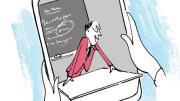“Our students are way ahead of us technologically,” says Susan D. Jones, an associate professor who teaches courses on the history of medicine, science, and technology at the University of Minnesota, in St. Paul. “The crucial thing is not just to apply technology on top of current teaching practices but to look carefully at curriculum and spend the resources—time and money—in helping faculty make the changeover” to more intensive, innovative teaching.
She would like to see holistic reform—not of “pieces of curriculum” but in the ways teaching is conducted daily—to help students move into the future. Research and experience show, she says, that students need to work on real-world problems, not just abstractions; generate their own ideas and conclusions from course content; and learn how to communicate these ideas to a relevant community. Today and in the future, communication requires a capacity for understanding differences among people and cultures, along with understanding the technological interfaces that involve virtual groups who are increasingly part of the conversation.
Jones points to the rise of immersive learning and online education, “in which students participate in problem-solving in multi-user virtual environments,” forms consistent with the social-media outlets that are changing how and when students learn, with and through their peers. “Many faculty would be well served by a semester spent in intensive revamping of their standard courses,” she asserts. (She adds that “Harvard has the infrastructure, the Derek Bok Center for Teaching and Learning, on which it could build a faculty resource program.”) But the emphasis on virtual learning should not eliminate on-the-ground experience. Harvard could also consider creating a formal “service-learning program,” Jones says, in which students’ participation would contribute to their final course grades. Although she lamen ts there is little time built into faculty positions for this kind of teaching innovation, she says, “It will be crucial to move away from passive learning to this kind of group-oriented problem-solving as the basis for successful future pedagogy.”






